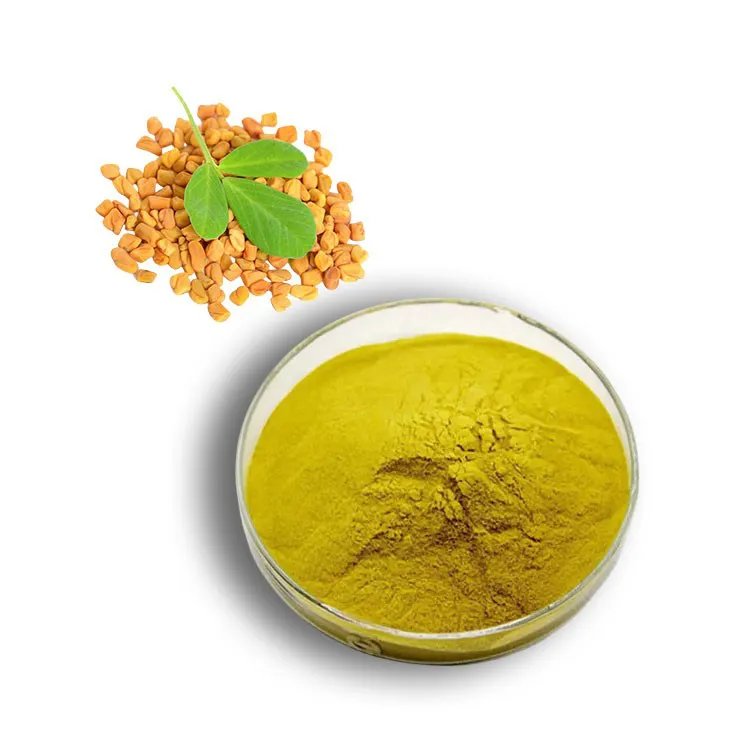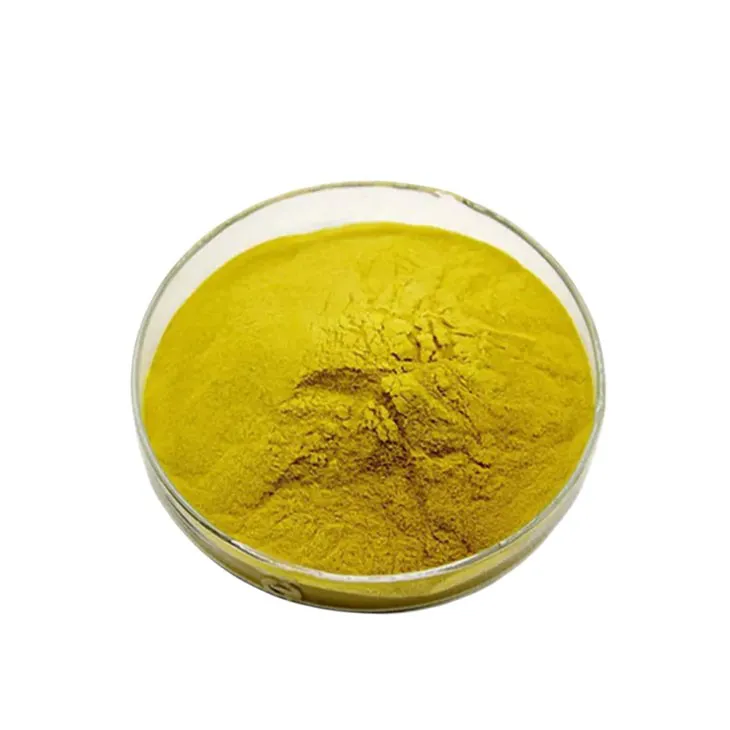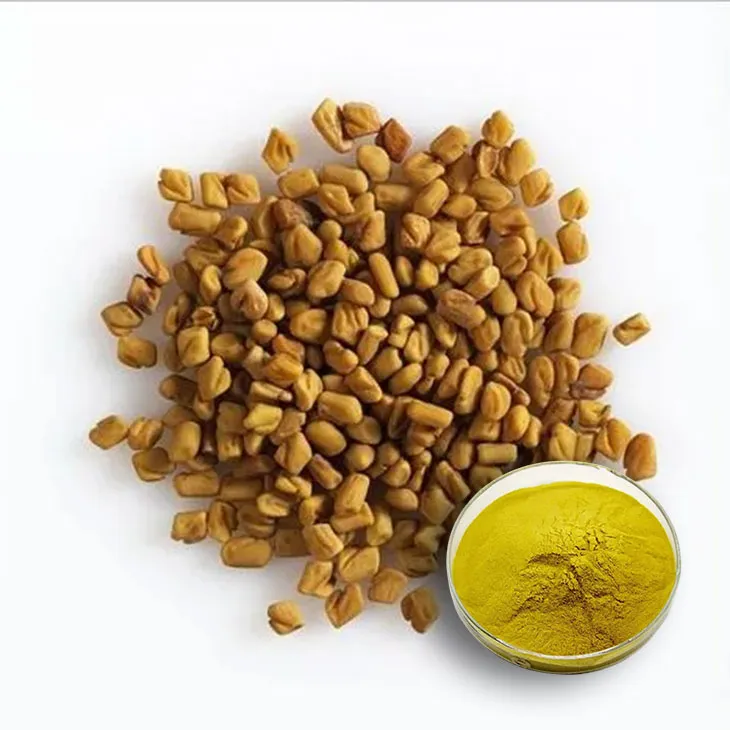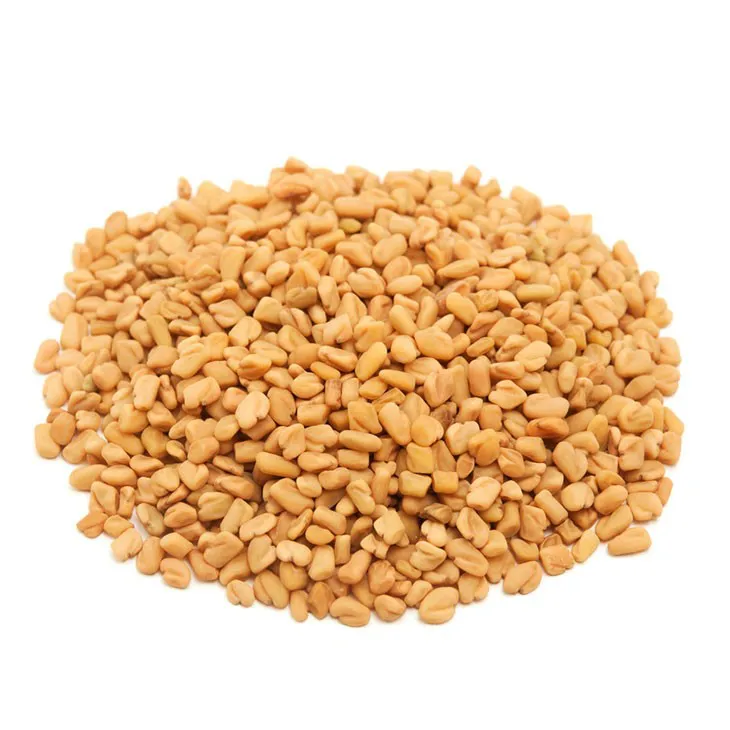- 0086-571-85302990
- sales@greenskybio.com
Extract fenugreek extract powder by steam distillation.
2024-11-29

1. Introduction
Fenugreek (Trigonella foenum - graecum) has been used for centuries in traditional medicine and cooking. It is rich in various bioactive compounds. Steam distillation is a popular method for extracting valuable components from fenugreek to obtain extract powder. This process is not only important for the production of high - quality fenugreek - based products but also has significant implications in the fields of herbal medicine, food additives, and cosmetics.

2. Fenugreek: Chemical Constituents Relevant to Extraction
Fenugreek contains a diverse range of chemical constituents that are of interest in the extraction process.
2.1. Volatile Oils
One of the main components are volatile oils. These oils are responsible for the characteristic aroma of fenugreek. They contain various terpenes and sesquiterpenes. For example, fenchone and limonene are some of the volatile compounds present. These volatile oils are relatively easily separated during steam distillation as they vaporize along with the steam.
2.2. Alkaloids
Fenugreek also contains alkaloids such as trigonelline. Although alkaloids are not as volatile as the oils, they can still be extracted to some extent during steam distillation. Trigonelline has been associated with various health benefits, including its potential role in blood sugar regulation.
2.3. Saponins
Saponins are another important group of compounds in fenugreek. They have surfactant - like properties. During steam distillation, the presence of saponins can affect the extraction efficiency as they can interact with other components. Saponins are also of great interest due to their potential health - promoting effects, such as cholesterol - lowering properties.

3. The Steam Distillation Process
The steam distillation process for Fenugreek Extract Powder extraction involves several key steps.
3.1. Preparation of Fenugreek
- Harvesting: Fenugreek seeds are typically harvested when they are fully mature. This ensures that the chemical constituents are at their optimal levels.
- Cleaning: The harvested seeds are thoroughly cleaned to remove any dirt, debris, or other impurities. This is crucial as impurities can interfere with the extraction process.
- Grinding: The clean seeds are then ground into a fine powder. Grinding increases the surface area of the fenugreek, allowing for better interaction with the steam during distillation.
3.2. The Distillation Setup
- Steam Generator: A steam generator is used to produce steam. The steam should be of a consistent quality and pressure. This is important as inconsistent steam can lead to variable extraction results.
- Distillation Flask: The ground fenugreek powder is placed in a distillation flask. The flask is connected to the steam generator and other components of the distillation setup.
- Condenser: A condenser is used to cool down the vapor mixture of steam and fenugreek compounds. As the vapor cools, it condenses back into a liquid, which can then be collected.
- Receiver Flask: The condensed liquid is collected in a receiver flask. This flask should be clean and sterile to prevent contamination of the extract.
3.3. Interaction between Steam and Fenugreek
When steam is passed through the ground fenugreek powder, several processes occur.
- The heat from the steam causes the volatile compounds in fenugreek to vaporize. The steam acts as a carrier for these vaporized compounds. For example, the volatile oils start to evaporate and are carried along with the steam.
- The steam also helps to break some of the chemical bonds within the fenugreek matrix. This can release other compounds such as alkaloids and saponins to a certain extent. However, the extraction of non - volatile compounds is not as efficient as that of volatile ones.
- The interaction between steam and fenugreek is also affected by factors such as temperature, pressure, and the duration of distillation. Higher temperatures and longer distillation times can generally lead to more complete extraction, but they can also cause degradation of some compounds.

4. Post - Extraction Handling of the Extract Powder
Once the extraction is complete, proper handling of the extract is crucial to ensure the quality of the final Fenugreek Extract Powder.
4.1. Drying
- Evaporation: The collected extract in the receiver flask may still contain some water. To obtain a dry extract powder, the water needs to be removed. This can be achieved through evaporation. Gentle heating can be applied to the extract to evaporate the water while minimizing the loss of volatile compounds.
- Dehydration Agents: In some cases, dehydration agents can be used. For example, anhydrous calcium chloride can be used to absorb the remaining water in the extract. However, care must be taken to ensure that the dehydration agent does not contaminate the extract.
- Drying Conditions: The drying process should be carried out under controlled conditions. The temperature and humidity should be monitored. High - temperature drying can cause the degradation of some heat - sensitive compounds in the extract, while high humidity can lead to re - absorption of water.
4.2. Storage
- Packaging: The dried Fenugreek Extract Powder should be packaged in appropriate containers. Airtight and opaque containers are preferred. Airtight containers prevent the absorption of moisture and the ingress of air, which can cause oxidation of the extract. Opaque containers protect the extract from light, as some of the compounds in fenugreek are light - sensitive.
- Storage Temperature: The storage temperature also plays a crucial role. The extract powder should be stored at a cool and dry place. Low - temperature storage can help to preserve the stability of the extract, especially for those compounds that are prone to degradation at higher temperatures.
- Shelf Life: The shelf life of the fenugreek extract powder depends on various factors such as the quality of the raw material, the extraction process, and the storage conditions. Under optimal conditions, the extract powder can have a relatively long shelf life, but regular quality checks are still recommended to ensure its efficacy.

5. Impact of Post - Extraction Steps on the Final Product's Quality for Different Applications
The quality of the fenugreek extract powder is crucial for its various applications, and the post - extraction steps can have a significant impact.
5.1. In Herbal Medicine
- For herbal medicine applications, the integrity of the bioactive compounds is of utmost importance. Improper drying or storage can lead to the degradation of compounds such as alkaloids and saponins, which are believed to have medicinal properties. For example, if trigonelline is degraded during drying or storage, the potential blood - sugar - regulating effect of the fenugreek extract may be compromised.
- Contamination during storage, such as the absorption of moisture or the ingress of microorganisms, can also render the extract ineffective or even harmful for medicinal use.
5.2. In Food Additives
- In the case of food additives, the flavor and aroma of the fenugreek extract are important factors. If the drying process is not carried out properly, the volatile oils may be lost, resulting in a less flavorful extract. This can affect the overall taste of the food product in which the fenugreek extract is used as an additive.
- The storage conditions also need to meet food - safety standards. Any contamination or degradation during storage can pose a risk to food safety, and consumers may notice off - flavors or odors in the food product.
5.3. In Cosmetics
- In cosmetics, the stability of the fenugreek extract is crucial. Cosmetics are often stored for extended periods, and the extract needs to remain stable during this time. Improper drying or storage can lead to changes in the chemical composition of the extract, which may affect its performance in products such as creams and lotions. For example, if the saponins are degraded, the emulsifying properties of the extract may be reduced, affecting the texture and stability of the cosmetic product.
- The purity of the extract is also important in cosmetics. Contamination during storage can introduce impurities that may cause skin irritation or other adverse reactions in consumers.
6. Conclusion
Steam distillation is a valuable method for extracting fenugreek extract powder. Understanding the chemical constituents of fenugreek, the steam distillation process, and the post - extraction handling steps is crucial for obtaining a high - quality product. The proper handling of the extract powder after extraction, including drying and storage, has a significant impact on the quality of the final product for different applications. By carefully controlling each step of the process, it is possible to produce fenugreek extract powder with consistent quality and efficacy.
FAQ:
What are the main chemical constituents in fenugreek relevant to steam distillation extraction?
Fenugreek contains various chemical constituents relevant to steam distillation extraction. Some of the important ones include volatile oils, alkaloids, and saponins. The volatile oils are of particular interest as they are more likely to be extracted by steam distillation. These components contribute to the characteristic flavor and potentially some of the bioactive properties of the fenugreek extract.
How does steam interact with fenugreek during the steam distillation process?
During steam distillation, steam passes through the fenugreek. The heat from the steam causes the cells of fenugreek to rupture. This allows the volatile and other relevant compounds to be released. The steam then carries these compounds along as it rises. Since the compounds have different volatilities, they are separated based on their vapor - pressure differences. The steam and the extracted compounds then enter a condenser where they are cooled and converted back into liquid form for further collection.
What are the key factors affecting the quality of fenugreek extract powder obtained by steam distillation?
Several factors can affect the quality. Firstly, the quality of the raw fenugreek material is crucial. If it is contaminated or of poor quality, it will impact the final extract. The temperature and pressure during steam distillation play a significant role. Incorrect settings may lead to incomplete extraction or degradation of the compounds. Also, the post - extraction steps such as drying conditions (temperature, humidity, and drying time) and storage conditions (e.g., exposure to light, oxygen, and moisture) can greatly influence the quality of the extract powder.
How should the fenugreek extract powder be dried after steam distillation?
There are several drying methods that can be used for fenugreek extract powder after steam distillation. One common method is air drying, which is a relatively gentle method. However, it may take a longer time. Another option is vacuum drying, which can remove moisture more quickly while minimizing exposure to oxygen. Spray drying is also used in some cases, especially for large - scale production. It can produce a fine powder with good flowability. The choice of drying method depends on factors such as the scale of production, the desired properties of the final product, and cost considerations.
What are the proper storage conditions for fenugreek extract powder?
The fenugreek extract powder should be stored in a cool, dry, and dark place. Exposure to high temperatures can cause degradation of the compounds. Moisture can lead to spoilage or mold growth. Light can also have a negative impact on the stability of the extract. It is often advisable to store the powder in air - tight containers to prevent exposure to oxygen, which can cause oxidation of the components in the extract.
Related literature
- Steam Distillation: Principles and Applications in Botanical Extracts"
- "Fenugreek: Chemical Composition and Extraction Technologies"
- "Optimization of Steam Distillation for Herbal Extract Production"
- ▶ Hesperidin
- ▶ citrus bioflavonoids
- ▶ plant extract
- ▶ lycopene
- ▶ Diosmin
- ▶ Grape seed extract
- ▶ Sea buckthorn Juice Powder
- ▶ Beetroot powder
- ▶ Hops Extract
- ▶ Artichoke Extract
- ▶ Reishi mushroom extract
- ▶ Astaxanthin
- ▶ Green Tea Extract
- ▶ Curcumin Extract
- ▶ Horse Chestnut Extract
- ▶ Other Problems
- ▶ Boswellia Serrata Extract
- ▶ Resveratrol Extract
- ▶ Marigold Extract
- ▶ Grape Leaf Extract
- ▶ blog3
- ▶ blog4
-
100% Pure Natural L - carnitine.
2024-11-29
-
Chinese Motherwort Extract Powder Factory.
2024-11-29
-
100% 纯有机葡萄籽提取物粉
2024-11-29
-
Manufacturers of Organic Diosmin Powder.
2024-11-29
-
Cranberry Extract
2024-11-29
-
Okra Extract
2024-11-29
-
Giant Knotweed Extract
2024-11-29
-
Chia Seed Powder
2024-11-29
-
Red Date Extract
2024-11-29
-
Scutellaria Extract
2024-11-29
-
Andrographis Paniculata Extract Powder
2024-11-29
-
Echinacea Extract
2024-11-29
-
Dandelion Leaf Extract
2024-11-29
-
Genistein
2024-11-29





















